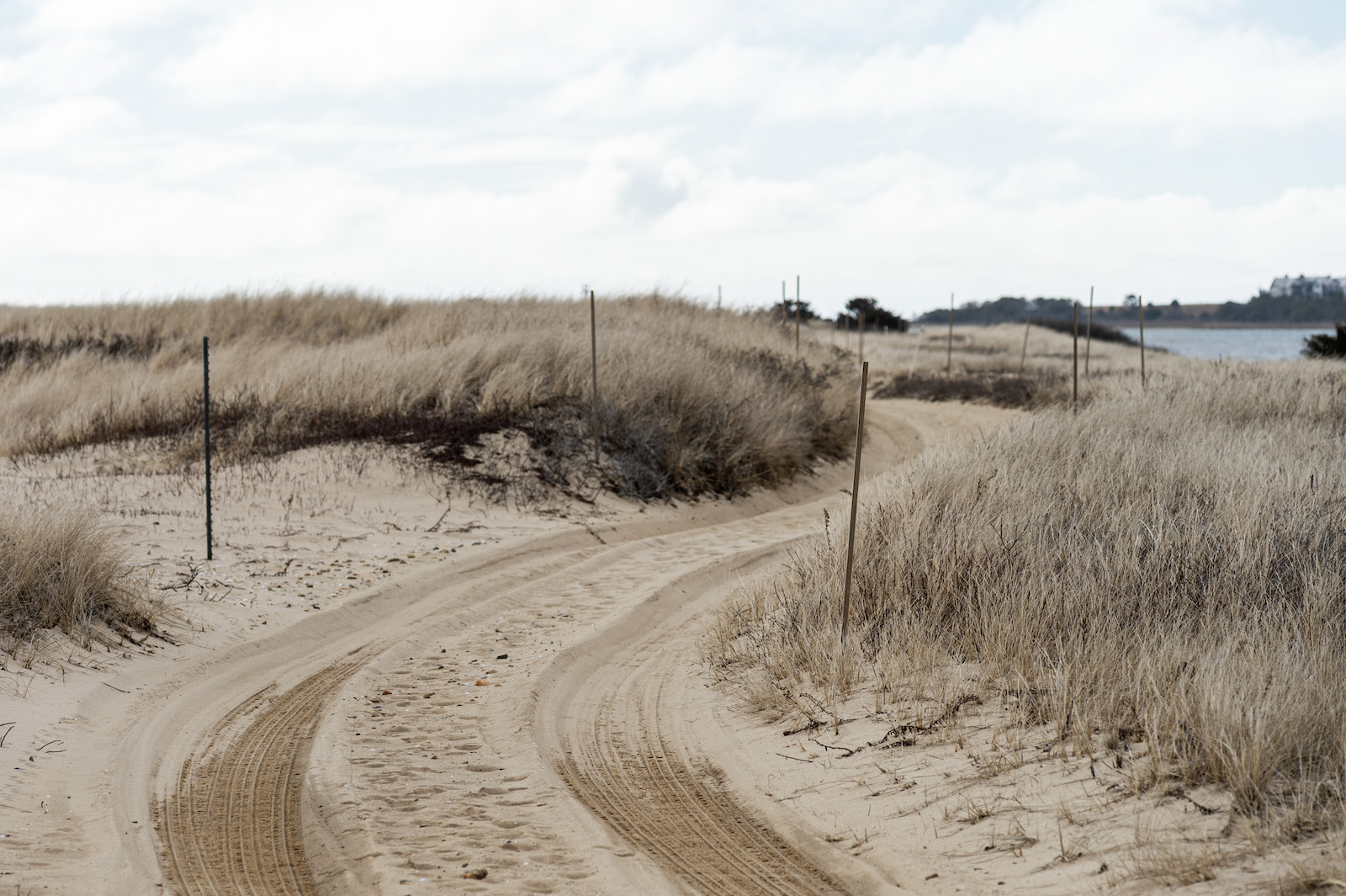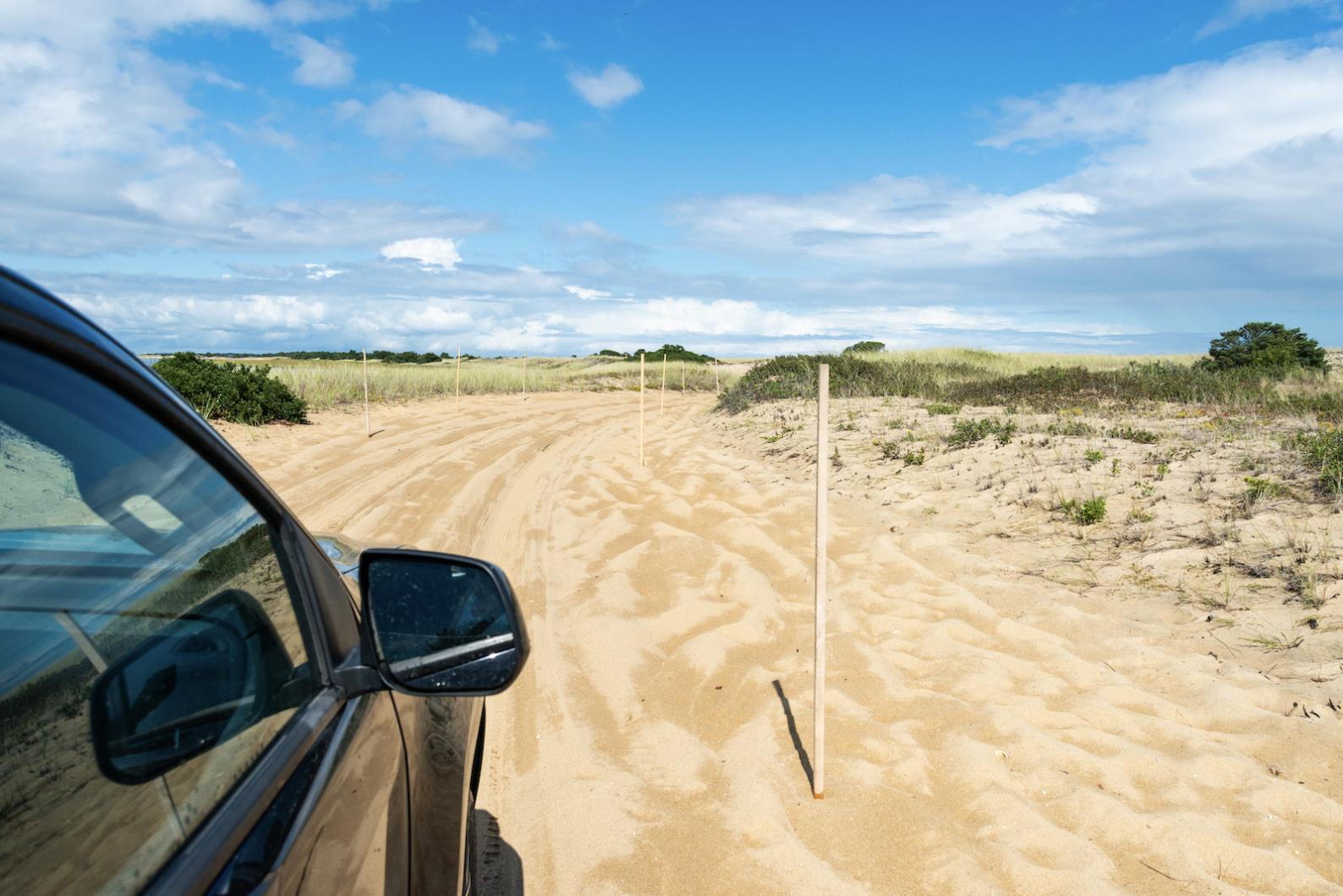A legal tug-of-war over Edgartown’s new rules for the Chappaquiddick oversand vehicle trails has broken out, with the nonprofit that manages the coastline and a citizen’s group both filing appeals with the state this week.
The Trustees of Reservations, which oversees the 16 miles of trails to the prized Chappy beaches, filed an appeal with the Massachusetts Department of Environmental Protection on Friday, asking the agency to overrule the Edgartown conservation commission’s decision to cap the number of vehicles allowed to drive on the sand trails, as well as close access past the Cape Pogue lighthouse to an area known as the Gut.
Chappaquiddick attorney Rachel Self, representing a group of 65 abutters and residents, also challenged the conservation commission’s ruling, saying there was no scientific backing employed during the permitting process.

At the heart of the argument is the commission’s May 15 vote to limit the number of oversand vehicles at Leland Beach, Wasque Reservation and on Cape Pogue. After months of meetings, and testimony from fishermen, beachgoers, Chappy residents and the Trustees staff, the commission decided to limit Leland and Wasque to 200 oversand vehicles at a time, and Cape Pogue to 30.
The commission also denied access to oversand vehicles past the Cape Pogue lighthouse.
The Trustees contend the new limits are too restrictive, and were not crafted in line with the state’s Wetlands Protection Act – the statute that is supposed to be the guiding light for the sensitive barrier beach area.
“The Commission’s orders for Cape Poge categorically remove 30 acres of Trustees property from access by the public, including noted fishing areas at the Gut, and severely limited the number of [oversand vehicles] in areas that, historically and according to state guidelines, accommodate significantly more visitors than the Commission has allowed,” the Trustees said in a statement Friday.
The Chappaquiddick citizen’s group seeks a more restrictive solution. In its appeal, filed Tuesday, group said the Trustees should have had more data backing its application.
“There were no studies or testimony provided from any biologist, scientists, ecologist, or coastal engineer,” the group wrote to the DEP. “No human impact studies were done. No [oversand vehicle] impact studies were done.”
The citizen's group, made largely of Chappaquiddick residents, worried about the toll the conservation commission’s limits could take on the beaches.
There is nothing to “support a proposition that what remains of our barrier beaches could support this intensity of use by recreational [oversand vehicles] coming and going, 24 hours per day, 365 days a year, as many times as desired,” the appeal stated.
The DEP can override local conservation commissions if their rulings don’t fall in line with state laws, and the DEP has done this in past Edgartown rulings, including the commission’s denial of wind turbine power cables running through Edgartown waters.
Kate Theoharides, the president and CEO of the Trustees, previously publicly lambasted the conservation commission oversand vehicle limits, saying they were designed to appease Chappaquiddick landowners.
In paperwork filed with the DEP, the Trustees also objected to the commission’s order to potentially install gates along Cape Pogue Elbow and the Gut and hold monthly meetings to talk about operations.
“The orders impose an onerous, burdensome monthly reporting requirement that is not mandatory to meet any performance standard of the Wetlands Protection Act regulations and would not trigger any action,” the Trustees wrote. “No other land trust on Martha’s Vineyard is subjected to a monthly reporting requirement.”
The Trustees had requested that it be allowed to have up to 300 vehicles across all of its trails. The commission instead choose to have two limits, one for Cape Pogue and another for Leland and Wasque.
The Trustees said this bifurcated limit was not needed and reiterated the request for 300 oversand vehicles in total across all properties in its appeal to the DEP.
In a statement Monday, the conservation commission said it was confident that DEP would uphold the commission's ruling and rejected the allegations of placating of landowners.
“The Commission considered the fragile nature of the beach and the historical use of OSVs, with attention to the changing nature of the beach,” the commission wrote. “Between the Elbow and the Gut, for instance, twice daily tidal cycles innundates the entire beach during portions of each day and the changing width of the beach north of the Dike Bridge makes it unsuitable for OSV passage during a significant portion of the year. The OSV trails north of the Dike Bridge, moreover, are significantly different from the trails on property to the south, requiring different standards.”
A spokesperson for the Trustees declined to comment further than the statement released by the nonprofit, which manages properties across the Island and Massachusetts.
Applicants have to appeal commission orders within 10 business days. The conservation commission officially signed off on the new limits on May 20 and the appeal period ends on June 4.
During the hearings the commission made a point to allow the existing regulations to remain intact until any appeal ended. Beachgoers sought this provision in case the new limits were appealed after the old ones expired – leaving no permission for oversand vehicles.
Peter Sliwkoski, the president of the Martha’s Vineyard Beachgoers Access Group, said this was crucial.
“The current order of condition which allows access from Leland’s to the Town Jetty will be in place until the new order of conditions are filed and not appealed,” he said earlier this month after the conservation commission’s vote. “This means, we will have at least the same access we had last year.”
Editor's note: this article has been updated with information about citizen's group's appeal to the DEP and a statement from the conservation commission.






Comments (26)
Comments
Comment policy »